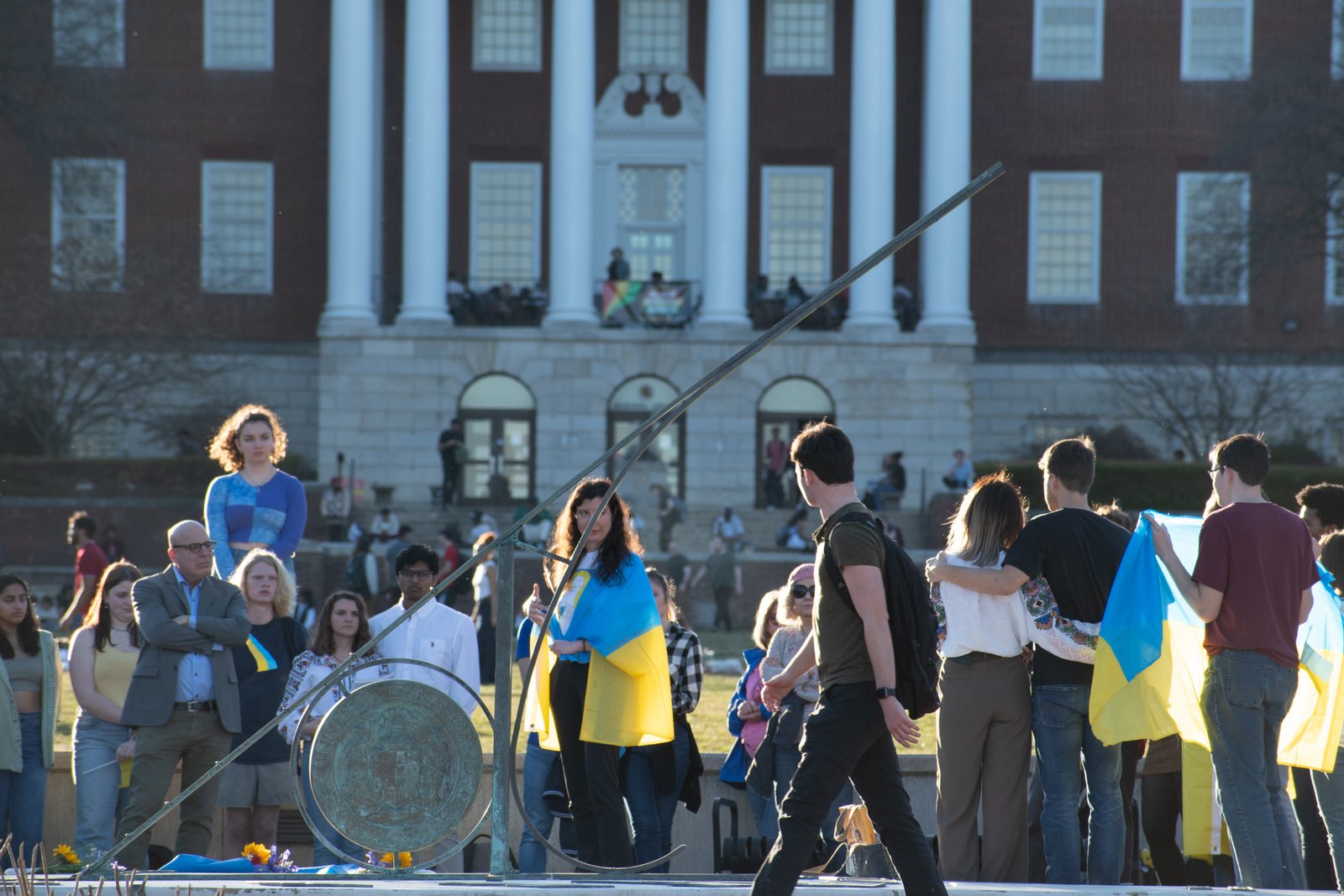First published Thursday, Feb. 23, 2023 in Stories Beneath the Shell.
In the midst of happy students basking in the unusually warm February weather, dozens of Ukrainian students were rather more somber, standing around the McKeldin Mall sundial to mark the first anniversary of Russia’s invasion of Ukraine on Thursday.
“It’s been a year of losses. It’s been hard here, but we are here,” said organizer Tetiana Tytko, a second language acquisition doctoral student. “Ukraine is fighting, nobody gave up.”
Around 50 students, staff, and faculty huddled around the sundial for the vigil, listening to speeches from Ukrainian University of Maryland students, faculty, and staff. At least 8,000 civilians have died, according to United Nations estimates. Over 100,000 Ukrainian soldiers have died, while twice the number of Russian soldiers died, according to American estimates.
Among the soldiers killed is Tytko’s friend.
“He died as a hero because he was saving three other soldiers and he saved them. But he got killed,” she said.

A year ago, when Russia invaded Ukraine, postdoctoral fellow Oleksandra Kepple felt hopeless. She called her mom to tell her about the invasion but couldn’t get the word “war” out.
Ludmilla Kolokolova, a principal research scientist in the Department of Astronomy, told the crowd that she asked her family in Ukraine to come to the U.S. to live with her and be safe.
“Nobody did it. They said ‘We will fight. We will not leave our country.’ So when we talk about who are heroes, all people are heroes. They all continue fighting,” she said. “They don’t want to leave the country to be secure, to be safe. They want to win.”
Kepple, an advisor to the Ukrainian Student Association, also told her family to come to the U.S. Her family, too, refused, saying it was their duty to protect the country.
Junior Arsenii Karelin’s family is on the opposite side of the border. He said his older sister’s family had to leave Russia and move to Georgia to start a new life. Some of his friends have been conscripted into serving in Russia’s army and he has no idea what’s happened to them. His grandmother is too old to leave.
Speaking out against the war, the business major said, means imprisonment for many years.

Administration officials, including Patty Perillo, the vice president of student affairs, spoke of supporting Ukraine in its fight.
“There are no words. I feel like I just want to stand here with you in solidarity,” Perillo said, noting that she has lit a candle for Ukraine every day since the war broke out.
Ross Lewin, the associate vice president for international affairs, highlighted UMD’s partnership with a Ukrainian university in Kyiv, Ukraine’s capital. The two universities are looking for ways to collaborate in research, conferences, and exchanges.
Coping with the war takes a toll on the Ukrainians here.
“We have good days, and we have bad days. There are more bad days than good days.” Tytko said.
“Some days it’s like, everything’s fine and we’re winning the war and everything will be fine,” said Kepple. But sometimes, the news is traumatic — like news that Russia bombed a house and the survivors were screaming under the rubble.
The full-scale invasion of Ukraine a year ago followed Russia’s 2014 invasion and subsequent annexation of Crimea and Donetsk — neither of which is recognized by most nations. It felt distant to some.
“It did feel a little bit remote,” Tytko said.

She was busy protesting then-president Viktor Yanukovych, who had suddenly decided not to sign a political association and free trade agreement with the European Union. Russia called his later removal a “coup” and invaded, then annexed Crimea. A little later, it invaded Ukraine’s east. The conflict boiled on, outside of the international spotlight — until the full-scale invasion.
The resounding consensus was that the families in Ukraine go back to basics every day now. They focus on food and survival. Then, they focus on going about their lives as normally as possible — going to school, and going to work.
For School of Public Health Dean Boris Lushniak, whose family is Ukrainian, the war boils down to two simple statements.
“It really is a fight of good versus evil,” he said. “It’s democracy versus authoritarianism.”


Leave a Reply